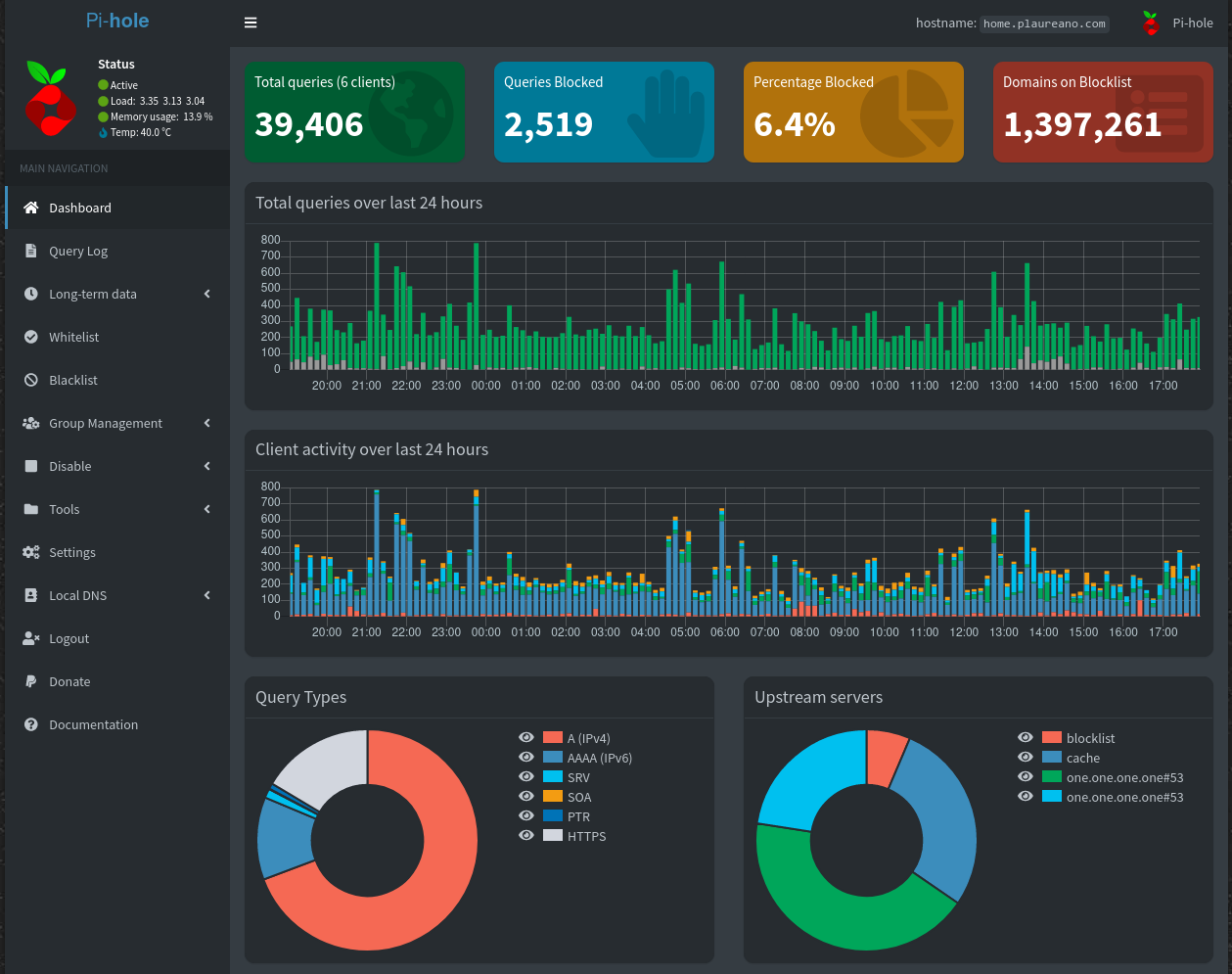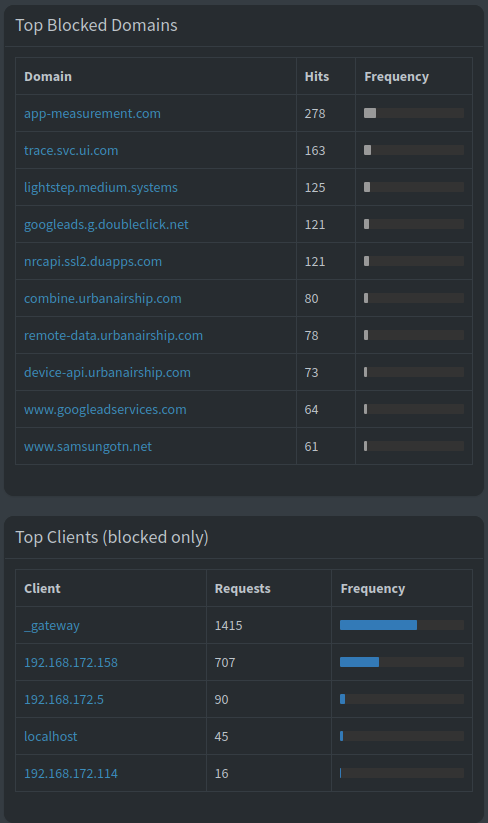
Stopping all ads and dangerous links on my home network!
Pi-hole ability to block ads “just works”. Browsing the web on any device on your local network becomes faster, and advertisements disappear from web pages. Furthermore, it bypasses the ability of most web pages to detect adblockers, meaning you will stop seeing the annoying requests to disable the blocker.
Depending on which lists of URL’s you want to block, you may also use them to prevent links to malware servers, porn, etc. For example, you can look at some of the lists I use and guess what some are blocking besides advertisements.

There are plenty of great lists for use with pi-hole, google around, and you will find them.
Once using pi-hole you will get a pretty good idea of what devices exist on your network and what they are doing. You will probably be surprised with some side-effects, like “adware” games suddenly not showing annoying videos. Appliances (like “smart” TV’s) were calling multiple domains owned by vendors and others I could not even identify.

I honestly believe this is useful to any household and dramatically improves the Internet experience. Besides, it makes up for an incredible learning journey for anyone who accepts the challenge, especially if they have no previous Linux experience. You are going to love it.
Hardware for your home server
You can install pi-hole on a humble Raspberry Pi home server. However, if you don’t have one already, or it is your first time setting a home server, I recommend a Raspberry pi 400 (the personal computer kit package) that should cost you around $140.

The Raspberry pi 400 computer kit comes with a lovely manual to guide you through your first contact with the operating system (RaspbienOS). Really! A computer with a user manual allows human beings to learn all the basic operations required to maintain and use the device. I know, it’s something taken out of last century’s home computers. In the best possible way!
As an alternative, if you have an old computer lying around, you can also repurpose it as a home Linux Server. Running Ubuntu/Debian/Fedora/CentOS will do just fine for a pi-hole server. Of course, you will need to learn about Linux and replace the Raspberry pi manual with some equally lovely book:
“Linux for Beginners: An Introduction to the Linux Operating System and Command Line” by Jason Cannon
It is not the same experience you get with the Raspberry Pi manual, but it will teach you everything you need to know. The author makes no assumptions about prior experience with Linux, which is good, and is easy to follow.
Installing the software
You have complete documentation regarding installation and operation on https://docs.pi-hole.net/
The project homepage is located on https://pi-hole.net/
The block lists I use
https://raw.githubusercontent.com/StevenBlack/hosts/master/hosts
http://sysctl.org/cameleon/hosts
https://s3.amazonaws.com/lists.disconnect.me/simple_tracking.txt
https://s3.amazonaws.com/lists.disconnect.me/simple_ad.txt
https://gitlab.com/quidsup/notrack-blocklists/raw/master/notrack-blocklist.txt
https://gitlab.com/quidsup/notrack-blocklists/raw/master/notrack-malware.txt
https://zerodot1.gitlab.io/CoinBlockerLists/list.txt
https://zerodot1.gitlab.io/CoinBlockerLists/list_browser.txt
https://zerodot1.gitlab.io/CoinBlockerLists/list_optional.txt
https://raw.githubusercontent.com/crazy-max/WindowsSpyBlocker/master/data/hosts/spy.txt
https://smokingwheels.github.io/Pi-hole/allhosts
https://raw.githubusercontent.com/anudeepND/blacklist/master/adservers.txt
https://raw.githubusercontent.com/FadeMind/hosts.extras/master/UncheckyAds/hosts
https://raw.githubusercontent.com/bigdargon/hostsVN/master/hosts
https://raw.githubusercontent.com/jdlingyu/ad-wars/master/hosts
https://phishing.army/download/phishing_army_blocklist_extended.txt
https://blocklistproject.github.io/Lists/alt-version/phishing-nl.txt
https://v.firebog.net/hosts/Prigent-Phishing.txt
https://blocklistproject.github.io/Lists/alt-version/malware-nl.txt
https://blocklistproject.github.io/Lists/alt-version/ransomware-nl.txt
https://raw.githubusercontent.com/ShadowWhisperer/BlockLists/master/Lists/Malware
https://curben.gitlab.io/malware-filter/urlhaus-filter-domains.txt
https://trainax.github.io/PiHoleLists/lists/Misc.txt
https://trainax.github.io/PiHoleLists/lists/Scam.txt
https://trainax.github.io/PiHoleLists/lists/Phishing.txt
https://blocklistproject.github.io/Lists/alt-version/fraud-nl.txt
https://blocklistproject.github.io/Lists/alt-version/drugs-nl.txt
https://blocklistproject.github.io/Lists/alt-version/crypto-nl.txt
https://blocklistproject.github.io/Lists/alt-version/ads-nl.txt
https://blocklistproject.github.io/Lists/alt-version/abuse-nl.txt




